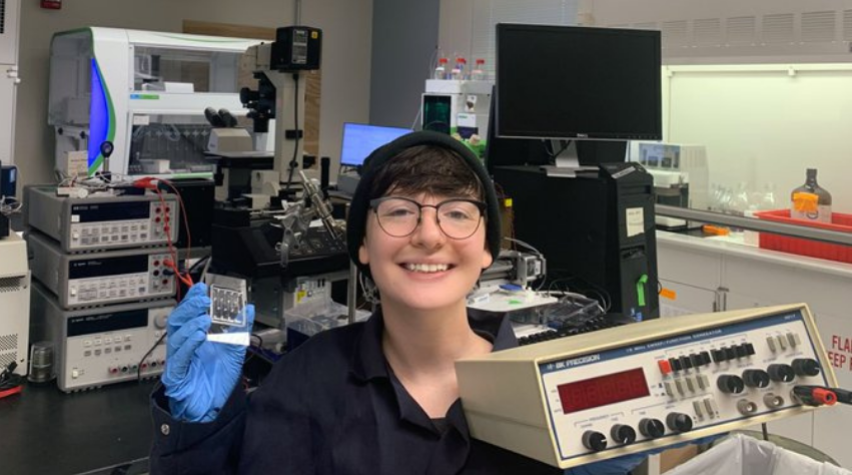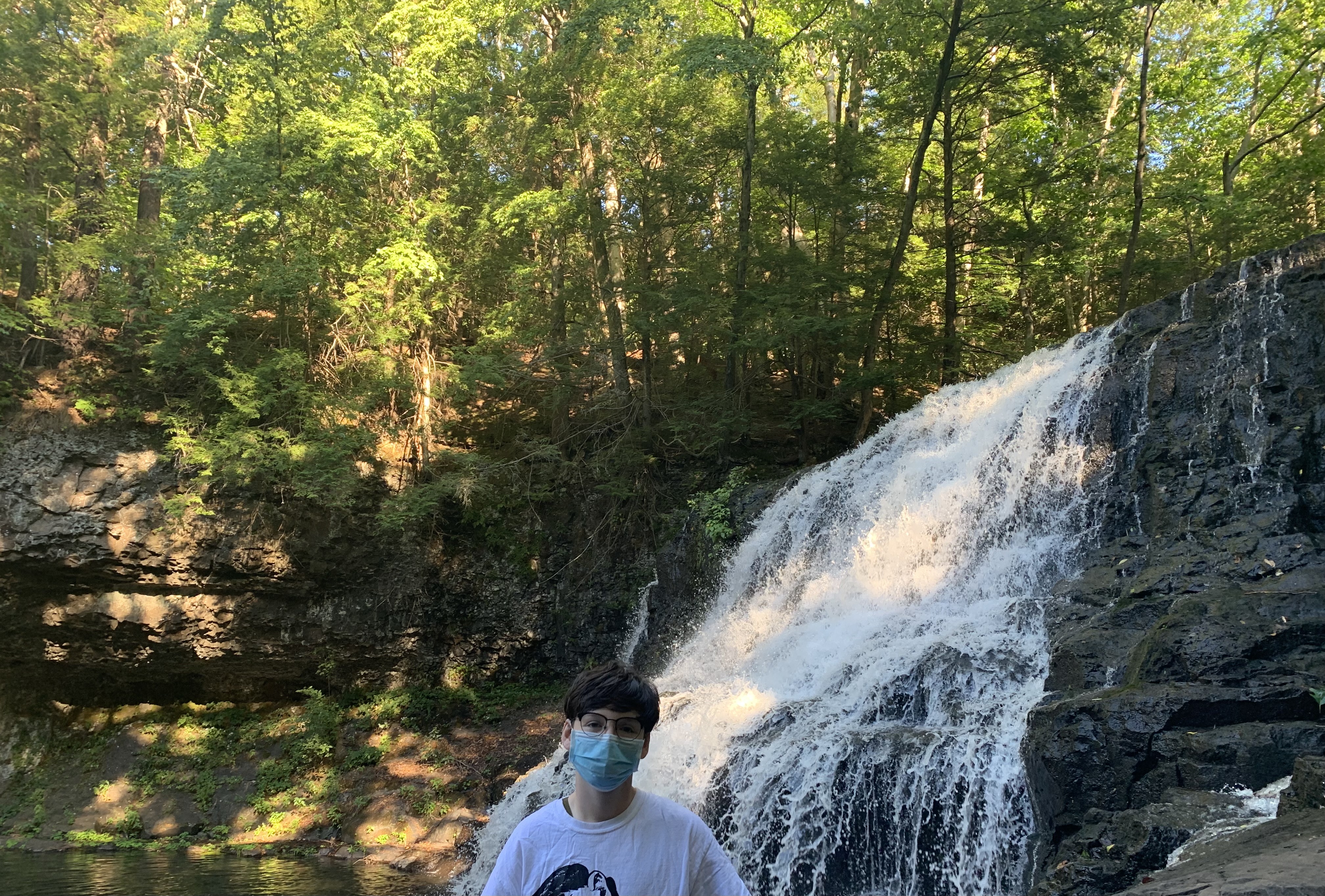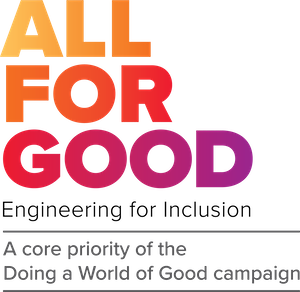
AIChE presents the most recent post in this series featuring LGBTQ+ engineers and their allies as part of an ongoing effort to share stories of equity, diversity, and inclusion. Other related efforts include a variety of LGBTQ+ programs and events at the 2021 Annual Meeting and ASC and those held at last year's meeting. These programs and events were all supported by the AIChE Foundation's Doing a World of Good Campaign.
In this installment of our series, we interviewed Cel Welch, who discusses their experience as an LGBTQ+ Ph.D. candidate in the School of Engineering at Brown University and head of Queer Engineer International and oSTEM@Brown.
Where did you complete your chemical engineering education?
I received my B.Sc. from McGill University and my M.Sc. from Brown University. My Ph.D. from Brown University is pending.
Tell us a bit about your job and your job responsibilities. What’s a typical day at work?
I am currently a Ph.D. candidate in the School of Engineering at Brown. Most days I work on my research in the lab/office space all day. This is a combination of wet lab experiments, physical modeling/design on the computer, and some calculations, data analysis, and writing thrown in. In my free time, I run Queer Engineer International and oSTEM@Brown.
Tell us a bit about your experience as an out LGBTQ professional working in engineering.
I am just getting started with my career journey and will need to complete a postdoc etc. before I can begin searching for a faculty position. To be honest, my journey up until this point has been difficult. I faced a lot of backlash for my gender expression and sexuality and was encouraged to tailor myself to capitalize on a more palatable form of diversity for the engineering field – being a cishet [i.e., cisgender and heterosexual] woman. I was told that my LGBTQIA+ identity was “too much” and that no one would consider working with someone like me if I didn’t at least act out the charade.
Brown is a nice environment where I have met numerous supportive faculty and students and generally found a great community where I feel respected and at home. That being said, I have still been called slurs while walking to the lab, gotten my car keyed, etc. Even well-meaning people routinely act extremely surprised when they find out that I am a Ph.D. candidate in engineering, but I tend to get a kick out of that stuff and not take it too personally. I think the biases that people hold towards visibly LGBTQIA+ people are humorous, but they are also indicative of a society that thinks that we aren’t worth very much.
I am very persistent, I don’t get upset easily, and I don’t give up. I have dreamed of becoming a Ph.D. researcher and running my own lab since childhood, so I am not worried about whether I can make it through to the other side. Doing this means a lot more to me than other folks, and I know I have the right stuff, but it can sometimes be a bumpy road to navigate.
Ultimately, we don’t want attention or to feel special or to exclude you, we want you to simply let us exist, let us work. We want only basic respect.
What are the most important issues that LGBTQ engineers deal with in the workplace today?
The current dominating mentality is still that it’s inappropriate to combine LGBTQIA+ and engineering. Many people in engineering are uncomfortable with people being open about their LGBTQIA+ identity and are irritated by initiatives for queer and trans engineers. Often, they will say that we are “obsessed with being the center of attention” or that we are “discriminating against the majority” when we are just fighting to be treated equally and not have to pretend to be someone else at work.
Further still, many people picture an “LGBTQIA+ engineer” as a cis white gay man ONLY, and struggle to see why his sexuality would matter given his other privileges. But there are LGBTQIA+ engineers with intersectional identities. There are many overlapping discrimination issues within the engineering field that affect people of different backgrounds, and there is no one size fits all.
Furthermore, if you think that we don’t need LGBTQIA+ x engineering diversity, equity, and inculsion (DEI) endeavors, it may be because you do not fully comprehend what happens in an LGBTQIA+ engineer’s life. If it’s not happening to you, you don’t always see it, but discrimination still exists. Sometimes it can be very blatant, like being called slurs or having your physical safety or property compromised. It can also be more subdued incidents of discrimination, like using the wrong pronouns or name, or assuming that everyone is cishet, or asking your coworker about his wife when he has a husband (or asking everyone else about their partners and skipping over him).
Ultimately, we don’t want attention or to feel special or to exclude you, we want you to simply let us exist, let us work. We want only basic respect. This also prefaces another, less severe but more pervasive issue. This is that well-meaning people in STEM are often not provided with the tools that they need to understand how to respectfully interact with LGBTQIA+ engineers. When DEI workshops and trainings are not mandatory or are ineffective, the baseline of understanding tends to be at the floor. Because there are so few LGBTQIA+ engineers, many people get very far along in their careers without ever meeting one or learning these skills.
People have frequently mentioned to me that they don’t feel that these trainings are necessary because “there are so few LGBTQIA+ engineers.” This mentality only serves to perpetuate a vicious cycle that prevents more LGBTQIA+ people from wanting to join a field where people frequently perceive them as an oddity, don’t understand how to act around them, and don’t know how to practice effective allyship.
How can people (peers who are allies, and members of management and leadership who are allies) help foster a more inclusive environment for LGBTQ chemical engineers?
Attend DEI workshops, panels, and discussions. Listen to what people from the group that you want to help are saying. Read literature about effective allyship. It doesn’t have to be boring! Enlist a friend or colleague, create a reading group, and spend some time educating yourselves with these resources. Then, go and educate other people, even host a diversity training at your institution (with relevant experts there as well). It’s important not just to learn, but also to share that knowledge with others and translate it into policy. This will help you to make DEI a genuine priority, a practical action rather than a theoretical discussion.
Lastly, your work is not done after the workshop ends. Make sure that you are keeping a watchful eye. The majority of us will not speak up if someone wrongs us unless our immediate physical safety or job security is threatened because we don’t want to be “that person.” Silence doesn’t imply that you have “solved DEI.”
A lot of students at Brown and beyond gravitate to me because I genuinely want to help them, and I don’t care if I “get nothing” in return. I never had anyone who set aside time for me like that or told me that I could succeed in engineering, and now I make it a huge goal of mine to do that for others.
Does your organization do anything to foster inclusivity for LGBTQ people? If so, please describe.
Queer Engineer International has numerous resources and initiatives that support LGBTQIA+ people in STEM (that’s our whole thing!). We have done visibility campaigns, speaker series, fundraisers, community support initiatives, and have even created our own scholarship. I highly recommend checking QE out if you are looking for a way to support LGBTQIA+ engineers (or if you are one yourself).
What was it like participating in the LGBTQ+ & Allies undergraduate panel at this year’s Annual Student Conference?
I really enjoyed serving as a panelist in the LGBTQ+ & Allies panel at the AIChE Annual Student Conference. It was great hearing the responses of the other panelists and meeting some professors, students, and other folks in attendance. AIChE has been a welcoming environment for me personally, and the panel was a very positive and affirming space, which is not always the case at engineering and science conferences.
As I mentioned during the panel, I prefer to blend in with the woodwork, but I always try to accept offers like this regardless because there’s a chance that someone in the audience will see themselves in me. I don’t want to pass up the chance of potentially positively affecting the life of even one person. Ultimately, I hope my presence on the panel helped some students to feel more confident in their ability to succeed as engineers.
What were the key messages you were hoping attendees would take away from your panel discussion?
As a panelist at events like this, I try to showcase myself authentically. As I mentioned, I want folks to be able to find something there that they can relate to. Especially with an undergraduate audience, I’m focused on showing them that I’m a normal person, not a super genius, and I have a sense of humor and a life where I have had to struggle too. Many of us are raised to think that engineers are super smart and naturally filled with this innate ability. Then the second we solve one problem incorrectly or fail one exam we throw our hands up and say, “Well, I can’t be an engineer now! I’m not cut out for this!” But failure is an important step along the pathway to success.
It’s also very important to me to talk on the same level as people instead of looking down on them – I was an undergraduate student just a few years ago so it’s easy for me to do this. It’s important for undergraduate engineers to visualize and connect with people like them who are Master’s and Ph.D. students, postdoctoral researchers, etc. These are all steps along the pipeline. Oftentimes they only see senior professors, and the gap between them and this accomplished person seems to be so wide that they feel that it can never be traversed. Just visualizing the next step is huge. You must see what the future that you want looks like in someone else in order to envision your own success.
A big thing that I try to do in my daily life is take marginalized and underrepresented students under my wing and show them the ropes. I tell them at face value that they have potential and to not let other people put them off, to know their worth and ask for what they think they deserve out of life. A lot of students at Brown and beyond gravitate to me because I genuinely want to help them, and I don’t care if I “get nothing” in return. I never had anyone who set aside time for me like that or told me that I could succeed in engineering, and now I make it a huge goal of mine to do that for others. I get a lot of enjoyment out of leading a research team and being a mentor to others, and I now have excellent mentors myself who have shown me the standard that I hope to one day hold myself to as a professor with my own lab.
Are there any LGBTQ inspirations, role models, or moments in history that are particularly important to you?
Yes. Ben Barres and Lynn Conway are huge role models of mine.
 Here, Cel is pictured hiking in Massachusetts
Here, Cel is pictured hiking in Massachusetts
What’s your dream getaway?
I love hiking, camping, and nature. I would love to have the time to do a really long-distance multi-day trek in a National Park or another location.
Join AIChE’s LGBTQ+ & Allies Online Community
This community is open to professional AIChE members who are LGBTQ+ and allies. Topics of discussion will include the ongoing development of LGBTQ+ initiatives at AIChE, plus issues concerning, and opportunities for, LGBTQ+ chemical engineering professionals.
Learn more about the community.
This initiative is supported by the AIChE Foundation's Doing a World of Good Campaign.
AIChE Foundation – All for Good Campaign

Learn more about AIChE's Diversity and Inclusion Initiatives.
Interested in helping?
Are you an LGBTQ+ chemical engineer and AIChE member interested in sharing your story to help create awareness around diversity and inclusion? Are you an LGBTQ+ ally interested in helping with diversity and inclusion efforts? Send us a note at chenected@aiche.org with the subject "Diversity and Inclusion."


